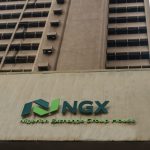Unlocking Capital for a sustainable earth – NGX CEO
 As the sustainable exchange championing Africa’s growth, Nigerian Exchange Limited (NGX) has a long-standing commitment to fostering the growth of long-term sustainable finance in Nigeria and across Africa. Securities exchanges are uniquely positioned at the heart of the financial industry, facilitating the effective and efficient allocation of resources for the purpose of economic growth and development. The convening power of securities exchanges also positions these outstanding institutions as a driving force for change.
As the sustainable exchange championing Africa’s growth, Nigerian Exchange Limited (NGX) has a long-standing commitment to fostering the growth of long-term sustainable finance in Nigeria and across Africa. Securities exchanges are uniquely positioned at the heart of the financial industry, facilitating the effective and efficient allocation of resources for the purpose of economic growth and development. The convening power of securities exchanges also positions these outstanding institutions as a driving force for change.
When I assumed office as the Chief Executive Officer of NGX just over a year ago, the over 6 decades old Nigerian Stock Exchange (NSE), had just completed its demutualisation process and transitioned to Nigerian Exchange Group (NGX Group) with three operating subsidiaries including NGX, NGX Regulation Limited and NGX Real Estate. The successful demutualisation heralded a new era for Nigeria’s premier bourse, an era characterised by boundles possibilities.
COVID-19 and a global health crisis
COVID-19 may have had an immediate impact on our health and wellbeing but climate change and biodiversity loss are expected to have a longer and more significant impact on our health if not properly addressed.
Amidst the unfortunate loss of lives and the associated economic downturn brought by the COVID-19 pandemic, the global capital market offered some respite through innovative financial solutions such as the COVID-19 bonds that are actively helping the global economic recovery. At the peak of the COVID-19 pandemic, we experienced high level collaborations across the private and public sectors. More so, we saw the birth of innovative financial instruments developed in respond to the COVID-19 crisis such as the unprecedented $3bn impact bond raised by the African Development Bank.
Securities exchanges, uniquely positioned at the centre of the capital market, have been at the heart of the development of these innovative financial solutions and continue to play their role in effectively allocating resources to facilitate the global economic recovery.
A looming environmental and climate crisis
We live in a world in which the top global risks in terms of likelihood are associated with a looming environmental and climate crisis. Clearly, it has come to the fore that climate change, biodiversity loss and other key environmental concerns are striking harder and more rapidly than previously thought. Various high profile incidents experienced in recent times, such as the heat waves in heatwaves in Canada, wildfires in Australia, and floods in parts of Europe and Asia, have highlighted the pressure of the global climate challenge on economic activities. The impacts of climate change such as warming temperatures, changes in precipitation, increases in the frequency or intensity of some extreme weather events are expected to have a significant impact on global food value chains. This will subsequently affect the key determinants of health – clean air, safe drinking water, sufficient food and secure shelter.
According to the World Health Organisation, the impact of climate change is expected to cause approximately 250,000 additional deaths per year due to malnutrition, malaria, diarrhoea and heat stress. Hence, Sub-Saharan African countries would need to develop their health infrastructure to address these predicted health challenges. In Africa, if climate change is not addressed, the increased weather and climate variability will expose a wider than expected population to extreme heat, drought and floods, thereby resulting in an increase in the poverty burden. Again, the capital market is well equipped to support this change through the deployment of innovative financial instruments such as green bonds, healthcare bonds amongst other sustainability bonds.
A Time to Build for Better
This year’s World Environment Day creates an opportunity for reflection. We need to reflect on the collective challenges we face in preserving the only place we know as our home and start to make decisions that put social and environmental benefits at the core of our individual activities and business operations. We have ‘Only one Earth’ and we all have a part to play in preserving it. The COVID-19 pandemic has shown us that our activities as individuals and businesses have an immediate impact on our loved ones, and on people all around the world. As we continue building back our lives and return business activities to normalcy, it is critical to rethink our model of growth.
Building for Better through Sustainable Finance
Over the course of my year at the Exchange, I have become more convinced of the potential of securities exchanges serving as a force for good. I have a firm belief that securities exchanges have a unique opportunity to advance sustainable development and combat climate change by fostering the growth of long-term sustainable finance in new ways that reflect the times that are characteristic of the world in we live in today.
In recent years, we have seen tremendous growth in green bonds as well as other sustainable financial instruments which are designed to tackle the climate crisis. As a leading securities exchange in Africa, NGX helped develop Africa’s first fully certified green bond, the debut Federal Government Sovereign ₦10.69 billion Green Bond. This is an area the Exchange has continued to play a leading role and will continue to with the support of all its stakeholders.
As part of today’s celebration of the 2022 World Environment Day, we are set to make good our commitment to foster the growth of long-term finance in Nigeria by launching a dedicated platform for sustainable finance instruments. I hope I can count on the unwavering support of our stakeholders to work with us to build a new normal that would help accelerate the achievement of sustainable development and climate change priorities across Africa, and a world where we can live sustainably in harmony with nature.





Leave a Reply